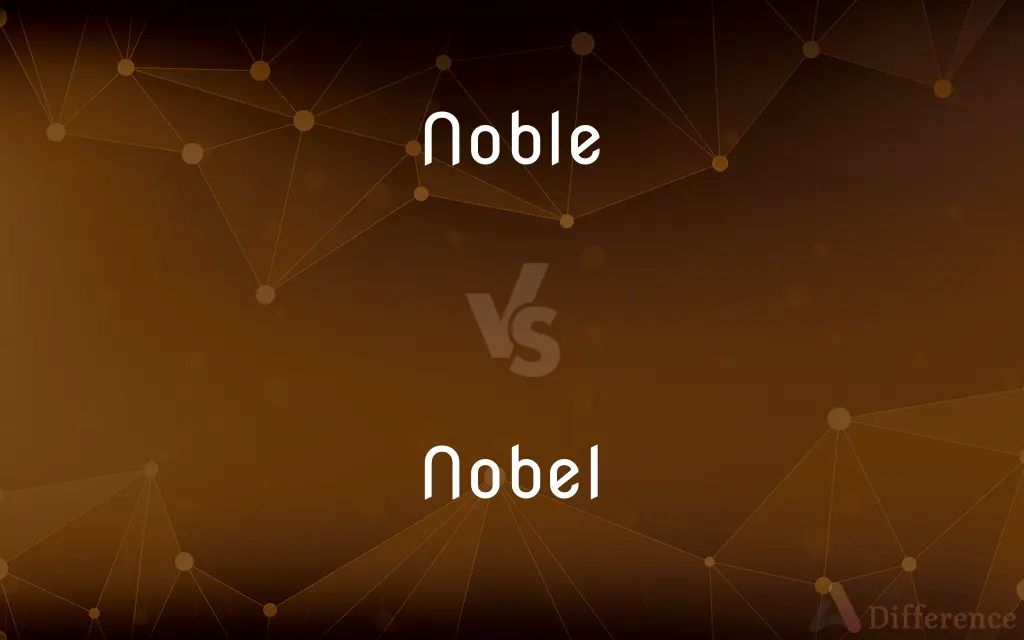Noble vs. Nobel — What's the Difference?
Edited by Tayyaba Rehman — By Urooj Arif — Updated on February 26, 2024
Noble refers to a person of high birth or rank, exhibiting qualities of high moral character, while Nobel is associated with the Nobel Prizes, prestigious awards given annually in several categories such as peace, literature, and sciences.

Difference Between Noble and Nobel
Table of Contents
ADVERTISEMENT
Key Differences
The term "noble" is primarily used to describe individuals of high societal rank, such as dukes, earls, and barons, emphasizing lineage and aristocracy. It also refers to moral excellence, suggesting qualities like honor, generosity, and bravery. "Nobel," on the other hand, relates to Alfred Nobel, the Swedish inventor and industrialist, and the Nobel Prizes established by his will. These awards recognize outstanding contributions to humanity in fields like physics, chemistry, medicine, literature, and peace.
"Noble" has historical roots dating back to feudal systems and chivalry, highlighting social hierarchy and virtues, the Nobel Prizes are a modern recognition of intellectual, cultural, or scientific advancements. The concept of nobility can be subjective, tied to cultural values and personal virtues, often represented in literature and history as an ideal to aspire to.
The former is associated with social status and ethical behavior, whereas the latter celebrates achievements that have a significant positive impact on the world. Nobel Prizes, however, are awarded based on specific achievements and contributions to society, evaluated by committees and organizations according to Alfred Nobel's criteria.
Nobility can be inherited or bestowed based on lineage, whereas Nobel Prizes are earned through individual or group contributions to humanity. The distinction between being born into a status versus achieving recognition through merit underscores the difference between the two terms.
Choosing between "noble" and "Nobel" depends on the context—whether discussing character and social rank or referring to the prestigious international awards. Despite their phonetic similarity, their meanings and applications are distinct, reflecting different aspects of society and human achievement.
ADVERTISEMENT
Comparison Chart
Definition
Referring to high birth, rank, or moral character
Associated with the Nobel Prizes
Context
Social hierarchy, virtue
Intellectual and humanitarian achievements
Origins
Feudal systems, chivalry
Alfred Nobel's will, established in 1895
Key Qualities
Honor, generosity, bravery
Innovation, contribution to humanity
Recognition
Social status, inherited or bestowed
Earned through achievements
Fields
Not applicable
Physics, chemistry, medicine, literature, peace
Purpose
Denote aristocracy or moral excellence
Recognize and reward significant contributions
Compare with Definitions
Noble
Pertaining to aristocracy or high moral character.
She was known for her noble lineage and generous deeds.
Nobel
Recognizing achievements in sciences, literature, and peace.
She won the Nobel Prize in Literature for her impactful work.
Noble
Embodying virtues of honor and bravery.
The knight's noble actions saved the village.
Nobel
A symbol of global recognition and prestige.
Nobel Laureates are celebrated for their groundbreaking contributions.
Noble
Of distinguished nature or quality.
They engaged in a noble pursuit of knowledge.
Nobel
Awarded by various committees and organizations.
The Nobel Committee awards the Peace Prize based on rigorous criteria.
Noble
Associated with nobility or aristocrats.
The castle was once home to a noble family.
Nobel
Relating to the Nobel Prizes, annual international awards.
The Nobel Peace Prize honors significant contributions to world peace.
Noble
Reflecting high ideals or excellence.
His speech was a noble call to peace.
Nobel
Associated with Alfred Nobel, the founder.
The Nobel Prizes were established by Alfred Nobel's will.
Noble
Belonging by rank, title, or birth to the aristocracy
The Duchess of Kent and several other noble ladies
The medieval palace was once owned by a noble Florentine family
Nobel
Swedish chemist remembered for his invention of dynamite and for the bequest that created the Nobel prizes (1833-1896)
Noble
Having or showing fine personal qualities or high moral principles
The promotion of human rights was a noble aspiration
Noble
Having or showing qualities of high moral character, such as courage, generosity, or honor
A noble spirit.
Noble
A member of the nobility.
Noble
Having honorable qualities; having moral eminence and freedom from anything petty, mean or dubious in conduct and character.
He made a noble effort.
He is a noble man who would never put his family in jeopardy.
Noble
A person of rank above a commoner; a nobleman; a peer.
Common Curiosities
What is the difference between noble and Nobel?
Noble refers to high social rank or moral character, while Nobel is associated with the Nobel Prizes, recognizing significant achievements.
Can noble qualities be developed?
Yes, noble qualities like honor, generosity, and bravery can be cultivated through personal development and actions.
Is noble status inherited?
Noble status is often inherited, but titles and the recognition of nobility can also be bestowed by a sovereign.
How are Nobel Prize winners selected?
Nobel Prize winners are selected by committees for each category, based on Alfred Nobel's criteria and their contributions to humanity.
What fields do the Nobel Prizes cover?
The Nobel Prizes cover physics, chemistry, medicine, literature, and peace, with an additional memorial prize in economic sciences.
Can organizations win a Nobel Prize?
Yes, organizations can be awarded the Nobel Peace Prize for their efforts in promoting peace and resolving conflicts.
What does it mean to come from a noble family?
Coming from a noble family means having ancestors of high social rank, often with titles recognized within a monarchy or aristocracy.
How often are Nobel Prizes awarded?
Nobel Prizes are awarded annually, with ceremonies traditionally held on December 10th, the anniversary of Alfred Nobel's death.
Can anyone become a Nobel laureate?
Yes, anyone who makes a significant contribution in the Nobel categories can potentially become a Nobel laureate, regardless of nationality.
Why were the Nobel Prizes created?
Alfred Nobel created the Nobel Prizes to leave a positive legacy and reward those whose work benefits humanity.
How do Nobel Prize winners impact society?
Nobel Prize winners impact society by advancing knowledge, fostering peace, and inspiring further achievements in their fields.
How is the Nobel Peace Prize unique among the Nobel Prizes?
The Nobel Peace Prize is unique for its focus on peace and reconciliation efforts, and it's awarded by the Norwegian Nobel Committee, unlike the other prizes.
Are Nobel Prizes awarded posthumously?
Nobel Prizes are not awarded posthumously, though there are few exceptions if the recipient dies between the announcement and the award ceremony.
What is the significance of noble deeds?
Noble deeds are actions that exemplify high moral standards and virtues, contributing positively to society and the welfare of others.
What is the role of nobility in modern society?
In modern society, the role of nobility has largely become ceremonial, with some members actively engaging in philanthropy and public service.
Share Your Discovery

Previous Comparison
Slice vs. Slide
Next Comparison
Great vs. ExcellentAuthor Spotlight
Written by
Urooj ArifUrooj is a skilled content writer at Ask Difference, known for her exceptional ability to simplify complex topics into engaging and informative content. With a passion for research and a flair for clear, concise writing, she consistently delivers articles that resonate with our diverse audience.
Edited by
Tayyaba RehmanTayyaba Rehman is a distinguished writer, currently serving as a primary contributor to askdifference.com. As a researcher in semantics and etymology, Tayyaba's passion for the complexity of languages and their distinctions has found a perfect home on the platform. Tayyaba delves into the intricacies of language, distinguishing between commonly confused words and phrases, thereby providing clarity for readers worldwide.














































